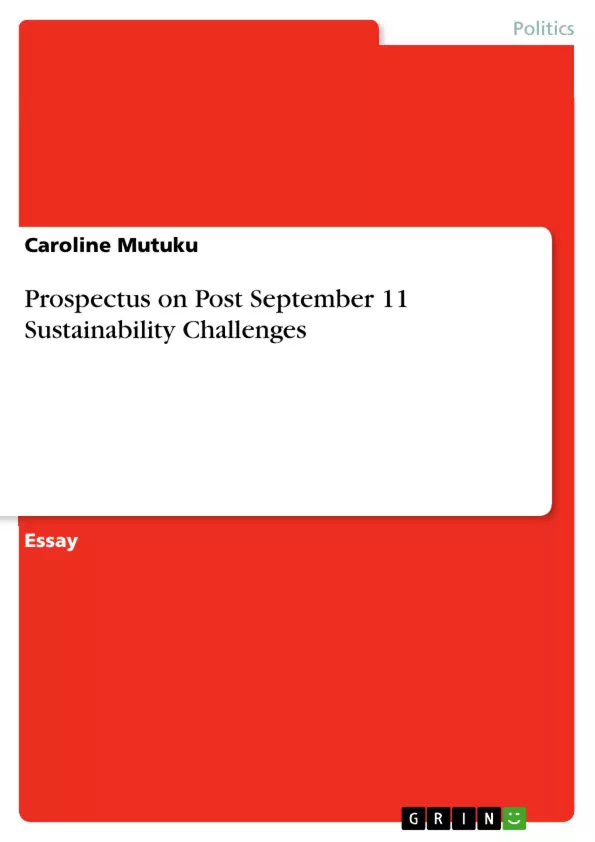September 11, 2001 remains an historic phenomenon in the history of the United States, as well as the whole world. In retrospect, the 9/11 terrorists’ attack on Pentagon and the World Trade Center changed the perception on terrorism and national security. In the pre-9/11, the aspect of homeland defense did not receive immense attention from a majority of people, and even some security agencies.
Grannis (2002) reaffirms this aspect by stating that approaches to counter terrorism were relatively missing. Only few government officials, think tank experts and academia showed interest in programs that focused on maintaining sustainability on domestic preparedness. Consequently, the U.S. Government in entirety did not consider domestic preparedness as one of the key priorities. However, the unprecedented terrorists’ attack by the nineteen hijackers in New York and Washington, as well as the subsequent biological attack, raised concerns on instruments of national power including intelligence, diplomacy and law enforcement. Prior to the attacks, al-Qaida’s were training thousands of terrorist recruits in Afghanistan under Iraq’s sponsorship, yet such aspects that threatened international security received little attention from the global security agencies. As such, it is apparent that sustainability on both domestic and international preparedness encompassed several challenges. In contrast, this aspect has changed in the post-9/11 in which the U.S. spending on homeland security has been increasing every year since 2001. However, the exclusive focus on counterterrorism approaches, in order to avert other terrorist attacks seems to have diverged the focus to domestic preparedness. It is explicit that the current security climate is characterized by extensive national security programs with a decreased focus on dual-use and all-hazard approaches to domestic preparedness. This presents a significant post-9/11 sustainability challenge.
Therefore, this paper aims at providing a comprehensive analysis on post-9/11 sustainability challenges and present appropriate recommendations.
Inhaltsverzeichnis (Table of Contents)
- Introduction
- Background Information
- The Sustainability Challenge of Setting of the Right Priorities
- The Sustainability Challenge of the Possible Resurfacing of an Earlier Concern
- Other Minor Sustainability Challenges
- Possible Solutions
- Recommendations
- Conclusion
Zielsetzung und Themenschwerpunkte (Objectives and Key Themes)
This paper aims to comprehensively analyze the sustainability challenges faced in domestic preparedness after the September 11 attacks, and to propose appropriate recommendations. The analysis focuses on the impact of the shift in priorities towards counterterrorism, the resurfacing of pre-existing concerns, and the need for a more comprehensive approach to domestic preparedness.
- The shift in priorities towards counterterrorism after 9/11, leading to a focus on terrorism-specific initiatives and a neglect of all-hazards preparedness.
- The resurgence of pre-existing concerns related to funding, coordination, and operational readiness in domestic preparedness programs.
- The need for a balanced approach to domestic preparedness that considers all-hazards threats, including natural disasters and technological emergencies.
- The importance of dual-use capabilities and the leveraging of existing resources to enhance domestic preparedness.
- The role of institutionalization and the adoption of resilient law enforcement operational strategies in ensuring long-term sustainability.
Zusammenfassung der Kapitel (Chapter Summaries)
- Introduction: This chapter introduces the historical context of September 11, 2001, highlighting its impact on national security perceptions. It argues that the events of 9/11 exposed vulnerabilities in both domestic and international preparedness, leading to a shift in priorities towards counterterrorism.
- Background Information: This chapter provides an overview of domestic preparedness programs in the pre-9/11 era, highlighting their limitations and challenges. It explores the roots of the current sustainability challenges, including inadequate funding, coordination issues, and a lack of focus on all-hazards preparedness.
- The Sustainability Challenge of Setting of the Right Priorities: This chapter examines the impact of increased government spending on national security and defense after 9/11. It highlights the growing concern over the prioritization of terrorism-specific initiatives at the expense of a more comprehensive all-hazards approach to domestic preparedness.
Schlüsselwörter (Keywords)
The main keywords and focus topics of the paper are domestic preparedness, sustainability challenges, counterterrorism, all-hazards approach, dual-use capabilities, operational readiness, funding, coordination, and institutionalization.
Frequently Asked Questions
How did 9/11 change the perception of national security?
Before 9/11, homeland defense received little attention. The attacks shifted the focus towards counterterrorism, intelligence, and law enforcement as key priorities for the U.S. Government.
What is the main sustainability challenge for domestic preparedness?
The exclusive focus on counterterrorism has diverted resources away from an "all-hazards" approach, which includes preparing for natural disasters and technological emergencies.
What are 'dual-use capabilities' in security?
These are resources and strategies that serve both specialized counterterrorism needs and general emergency management, enhancing overall domestic preparedness.
Why did domestic preparedness struggle before 2001?
Challenges included inadequate funding, poor coordination between agencies, and a lack of interest from academia and government officials in programs for domestic sustainability.
What recommendations does the paper offer for long-term security?
The paper suggests a balanced approach that considers all-hazards threats and emphasizes the institutionalization of resilient law enforcement strategies.
- Arbeit zitieren
- Caroline Mutuku (Autor:in), 2018, Prospectus on Post September 11 Sustainability Challenges, München, GRIN Verlag, https://www.grin.com/document/433785



